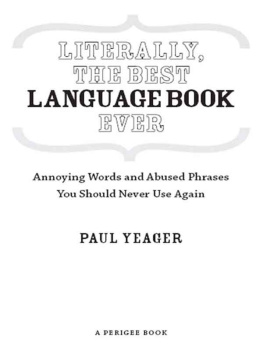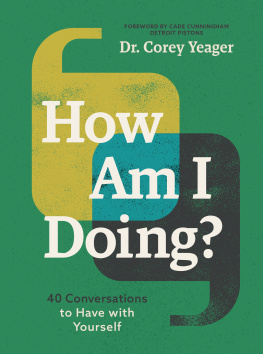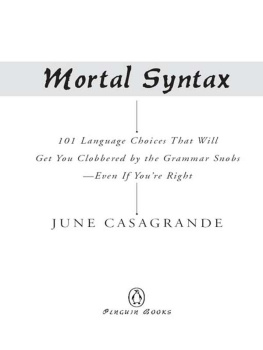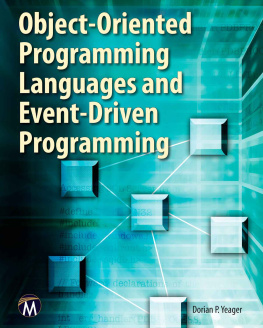LITERALLY, THE BEST LANGUAGE BOOK EVER
Annoying Words and Abused Phrases
You Should Never Use Again
PAUL YEAGER
A PERIGEE BOOK
A PERIGEE BOOK
Published by the Penguin Group
Penguin Group (USA) Inc.
375 Hudson Street, New York, New York 10014, USA
Penguin Group (Canada), 90 Eglinton Avenue East, Suite 700, Toronto, Ontario M4P 2Y3, Canada (a division of Pearson Penguin Canada Inc.)
Penguin Books Ltd., 80 Strand, London WC2R 0RL, England
Penguin Group Ireland, 25 St. Stephens Green, Dublin 2, Ireland (a division of Penguin Books Ltd.) Penguin Group (Australia), 250 Camberwell Road, Camberwell, Victoria 3124, Australia (a division of Pearson Australia Group Pty. Ltd.)
Penguin Books India Pvt. Ltd., 11 Community Centre, Panchsheel Park, New Delhi110 017, India Penguin Group (NZ), 67 Apollo Drive, Rosedale, North Shore 0632, New Zealand (a division of Pearson New Zealand Ltd.)
Penguin Books (South Africa) (Pty.) Ltd., 24 Sturdee Avenue, Rosebank, Johannesburg 2196, South Africa
Penguin Books Ltd., Registered Offices: 80 Strand, London WC2R 0RL, England
While the author has made every effort to provide accurate telephone numbers and Internet addresses at the time of publication, neither the publisher nor the author assumes any responsibility for errors, or for changes that occur after publication. Further, the publisher does not have any control over and does not assume any responsibility for author or third-party websites or their content.
Copyright 2008 by Paul Yeager
All rights reserved.
No part of this book may be reproduced, scanned, or distributed in any printed or electronic form without permission. Please do not participate in or encourage piracy of copyrighted materials in violation of the authors rights. Purchase only authorized editions.
PERIGEE is a registered trademark of Penguin Group (USA) Inc.
The P design is a trademark belonging to Penguin Group (USA) Inc.
Library of Congress Cataloging-in-Publication Data
Yeager, Paul.
Literally, the best language book ever: annoying words and abused phrases you should never use again / Paul Yeager.1st ed.
p. cm.
Includes index.
ISBN: 978-1-1012-2107-5
1. English languageErrors of usage. 2. English languageUsage.
I. Title.
PE1460.Y39 2008.
428dc22 2007046160
INTRODUCTION
Youre not safe from them anywhere. There are more of them today than there were yesterday, and there will be even more of them tomorrow. Theyre at work. Theyre at home. In fact, your parents, beloved grandparents, spouses, friends, and co-workers are all part of the problem, and if youre honest, youll have to admit that you are, too.
Im talking, of course, about language abusesyou know, the words, phrases, or expressions that make you want to stand up in a crowded room and desperately scream, Is there a language expert in the house? Most of us have felt that way at one time or another, and how could we not? Daily conversations are so overstuffed with words and phrases that are trite, trendy, grammatically incorrect, inane, outdated, or inappropriately informal that listening is sometimes impossible.
Instead of simply saying what we mean in our own words, we now use prepackaged phrases, ineffective trendy expressions, and redundancies more than ever before. After hearing reach out at work ten times before lunch, I often wish that monks werent the only group of people who were known to take a vow of silence. Instead of thinking of a unique solution , we must think outside the box . Instead of something being finished , it has to be completely finished . Nothing is merely essential any longer; its absolutely essential .
Were also turning perfectly fine nouns into verbs at an unprecedented rate, with the result being many awkward non-words being added to our vocabularies. Instead of assigning a task to someone , were now tasking someone with an assignment . Instead of having a dialogue with someone , were dialoguing with him . Instead of making a transition , were transitioning from one thing to another. Whats next? Instead of asking someone to turn on a lamp or get a glass of water , are we going to ask him to lamp the room or glass some water ?
One of my personal favorites, and part of the inspiration for the title of this book, is the need for drama or, more accurately, melodrama in our language. Its not expressive enough to have had a bad day ; its got to be the worst day ever . Its not good enough to have had a good birthday ; it has to be the best birthday ever . Its nearly impossible to go through an entire conversation without hearing at least one worst ever , best ever , most ever , smallest ever , biggest ever , loudest ever , greatest ever , fastest ever , slowest ever .
Ever , ever , ever over and over and over again; tell me thats not annoying!
Of course, being annoyed isnt reason enough to write a book; otherwise, wed all have to write books about all types of things. For instance, Id also be writing books on reality television shows and using cell phones while driving. The reason for writing this particular book is that I wanted to make a serious attempt in a not completely serious way to help us communicate better.
Our personal use of language is as telling as a purple Mohawk haircut or body piercings or a tailored three-piece suit. Through our words, we have our best opportunity to let people know who we are and what we have to offer. That makes our language choices critical. When people follow the lead of others by using a prefabricated or trendy phrase rather than expressing thoughts and ideas in their own way, they are not only discarding their most basic form of individuality and creativity but are also training themselves to stop thinking. Mental laziness and playing follow the leader are good ways to ensure failure, while alertness and individuality are hallmarks of all successful people.
At work, when one person speaks in a less articulate manner than another person, the natural assumption is that the less articulate person is less prepared for the more challenging job. Thats how one person is labeled as a nice guy, but hes not too smart while he struggles to advance, and another is labeled as bright and can get the job done and receives promotion after promotion. Studies have shown that people with good verbal skills receive higher wages than those with poor verbal skills.
Good communication is not just important at work. The healthiest relationships with family and friends are those that deal with honest expressions of emotions, which is impossible when using clichs and not-so-clever quips. If a family member is disappointed about a job loss or if a friend is upset about a breakup, its more respectful and helpful to deal with that specific problem than it is to reach into a bag of trite phrases and offer a blatantly dismissive I wouldnt worry about that if I were you or Life isnt supposed to be easy line. Imagine how ineffective that would be for you if you were the one going through a difficult time; triteness and insincerity are rarely considered synonyms for loving and supportive .
As far as starting new friendships, as we all know, the first impression is critical, and the first conversation is the most important part of generating that first impression. Many of us even remember the first time we had a conversation with someone who ultimately became a close friend. Its doubtful that any of us would like phrases such as Awesome, dude or Its freakin me out or I worked my ass off to be part of our legacywell, most of us anyway.
The entries in the book, more than 350 of them, have come from several sources. Many of them have come from my own observations, especially since my background as a writer, scientist (meteorologist), and managing editor of AccuWeather.com has honed my language and observation skills. Many of the entries have come from my wife, who is also a language and grammar expert (the finest I know) and who is also disturbed by the state of our discourse. In other words, she gets as annoyed about language as I do!











